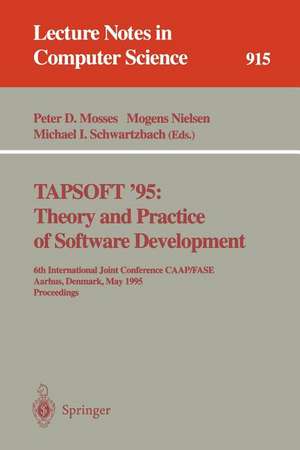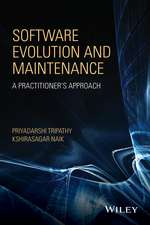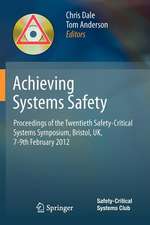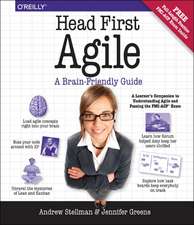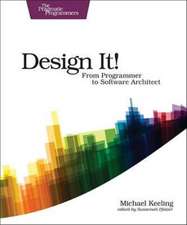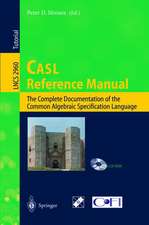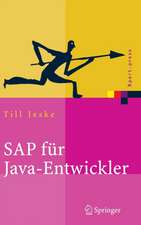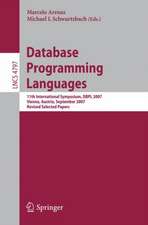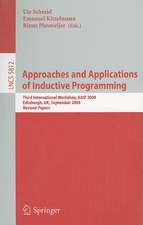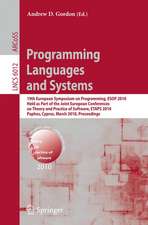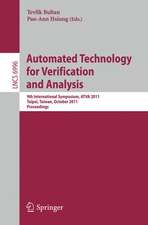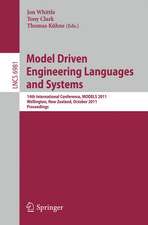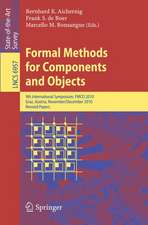TAPSOFT '95: Theory and Practice of Software Development: 6th International Joint Conference CAAP/FASE, Aarhus, Denmark, May 22 - 26, 1995. Proceedings: Lecture Notes in Computer Science, cartea 915
Editat de Peter D. Mosses, Mogens Nielsen, Michael I. Schwartzbachen Limba Engleză Paperback – 3 mai 1995
The volume contains seven invited papers, among them one by Vaugham Pratt on the recently revealed bug in the Pentium chip, and 44 revised full papers selected from a total of 147 submissions. In addition the TAPSOFT '95 proceedings contains 10 tool descriptions.
Din seria Lecture Notes in Computer Science
- 20%
 Preț: 1061.55 lei
Preț: 1061.55 lei - 20%
 Preț: 307.71 lei
Preț: 307.71 lei - 20%
 Preț: 438.69 lei
Preț: 438.69 lei - 20%
 Preț: 645.28 lei
Preț: 645.28 lei -
 Preț: 410.88 lei
Preț: 410.88 lei - 15%
 Preț: 580.46 lei
Preț: 580.46 lei - 17%
 Preț: 427.22 lei
Preț: 427.22 lei - 20%
 Preț: 596.46 lei
Preț: 596.46 lei -
 Preț: 381.21 lei
Preț: 381.21 lei - 20%
 Preț: 353.50 lei
Preț: 353.50 lei - 20%
 Preț: 1414.79 lei
Preț: 1414.79 lei - 20%
 Preț: 309.90 lei
Preț: 309.90 lei - 20%
 Preț: 583.40 lei
Preț: 583.40 lei - 20%
 Preț: 1075.26 lei
Preț: 1075.26 lei - 20%
 Preț: 310.26 lei
Preț: 310.26 lei - 20%
 Preț: 655.02 lei
Preț: 655.02 lei - 20%
 Preț: 580.93 lei
Preț: 580.93 lei - 20%
 Preț: 340.32 lei
Preț: 340.32 lei - 15%
 Preț: 438.59 lei
Preț: 438.59 lei - 20%
 Preț: 591.51 lei
Preț: 591.51 lei - 20%
 Preț: 649.49 lei
Preț: 649.49 lei - 20%
 Preț: 337.00 lei
Preț: 337.00 lei -
 Preț: 449.57 lei
Preț: 449.57 lei - 20%
 Preț: 607.39 lei
Preț: 607.39 lei - 20%
 Preț: 1024.44 lei
Preț: 1024.44 lei - 20%
 Preț: 579.30 lei
Preț: 579.30 lei - 20%
 Preț: 763.23 lei
Preț: 763.23 lei - 20%
 Preț: 453.32 lei
Preț: 453.32 lei - 20%
 Preț: 575.48 lei
Preț: 575.48 lei - 20%
 Preț: 585.88 lei
Preț: 585.88 lei - 20%
 Preț: 825.93 lei
Preț: 825.93 lei - 20%
 Preț: 763.23 lei
Preț: 763.23 lei - 17%
 Preț: 360.19 lei
Preț: 360.19 lei - 20%
 Preț: 1183.14 lei
Preț: 1183.14 lei - 20%
 Preț: 340.32 lei
Preț: 340.32 lei - 20%
 Preț: 504.57 lei
Preț: 504.57 lei - 20%
 Preț: 369.12 lei
Preț: 369.12 lei - 20%
 Preț: 583.40 lei
Preț: 583.40 lei - 20%
 Preț: 343.62 lei
Preț: 343.62 lei - 20%
 Preț: 350.21 lei
Preț: 350.21 lei - 20%
 Preț: 764.89 lei
Preț: 764.89 lei - 20%
 Preț: 583.40 lei
Preț: 583.40 lei -
 Preț: 389.48 lei
Preț: 389.48 lei - 20%
 Preț: 341.95 lei
Preț: 341.95 lei - 20%
 Preț: 238.01 lei
Preț: 238.01 lei - 20%
 Preț: 538.29 lei
Preț: 538.29 lei
Preț: 672.03 lei
Preț vechi: 840.04 lei
-20% Nou
Puncte Express: 1008
Preț estimativ în valută:
128.61€ • 133.45$ • 107.49£
128.61€ • 133.45$ • 107.49£
Carte tipărită la comandă
Livrare economică 15-29 martie
Preluare comenzi: 021 569.72.76
Specificații
ISBN-13: 9783540592938
ISBN-10: 3540592938
Pagini: 836
Ilustrații: XVI, 820 p.
Dimensiuni: 155 x 233 x 44 mm
Greutate: 1.15 kg
Ediția:1995
Editura: Springer Berlin, Heidelberg
Colecția Springer
Seria Lecture Notes in Computer Science
Locul publicării:Berlin, Heidelberg, Germany
ISBN-10: 3540592938
Pagini: 836
Ilustrații: XVI, 820 p.
Dimensiuni: 155 x 233 x 44 mm
Greutate: 1.15 kg
Ediția:1995
Editura: Springer Berlin, Heidelberg
Colecția Springer
Seria Lecture Notes in Computer Science
Locul publicării:Berlin, Heidelberg, Germany
Public țintă
ResearchCuprins
A decade of TAPSOFT.- Theory and practice of software development.- Rational spaces and set constraints.- Formal methods and social context in software development.- Testing can be formal, too.- Anatomy of the Pentium bug.- Rational mechanics and natural mathematics.- First-order logic on finite trees.- Decidability of equivalence for deterministic synchronized tree automata.- The equivalence problem for letter-to-letter bottom-up tree transducers is solvable.- ?I: A symmetric calculus based on internal mobility.- Complete inference systems for weak bisimulation equivalences in the ?-calculus.- Reasoning about higher-order processes.- Confluence of processes and systems of objects.- An algebraic approach to temporal logic.- On behavioural abstraction and behavioural satisfaction in higher-order logic.- Assumption/guarantee specifications in linear-time temporal logic (extended abstract).- Fine hierarchy of regular ?-languages.- Computing the Wadge degree, the Lifschitz degree, and the Rabin index of a regular language of infinite words in polynomial time.- Semi-trace morphisms and rational transductions.- Nonfinite axiomatizability of shuffle inequalities.- On the category of Petri net computations.- High undecidability of weak bisimilarity for Petri nets.- Polynomial algorithms for the synthesis of bounded nets.- Semi-completeness of hierarchical and super-hierarchical combinations of term rewriting systems.- Lazy narrowing: Strong completeness and eager variable elimination (extended abstract).- On the expressive power of algebraic graph grammars with application conditions.- Generated models and the ?-rule: The nondeterministic case.- CPO models for a class of GSOS languages.- Statecharts, transition structures and transformations.- An imperative objectcalculus.- A refinement of import/export declarations in modular logic programming and its semantics.- Strictness and totality analysis with conjunction.- Generic techniques for source-level debugging and dynamic program slicing.- Reasoning with executable specifications.- Calculating software generators from solution specifications.- Comparing flow-based binding-time analyses.- Can you trust your data.- Static and dynamic processor allocation for higher-order concurrent languages.- Mechanized inductive proof of properties of a simple code optimizer.- Describing a Signal Analyzer in the process algebra PMC — A case study.- A gentle introduction to specification engineering using a case study in telecommunications.- Precise interprocedural dataflow analysis with applications to constant propagation.- Formal specification and prototyping of a program specializer.- Proving the correctness of recursion-based automatic program transformations.- Reactive system specification and refinement.- Measuring concurrency of regular distributed computations.- Non-speculative and upward invocation of continuations in a parallel language.- A model inference system for generic specification with application to code sharing.- Relations as abstract datatypes: An institution to specify relations between algebras.- Performance-oriented formal specifications — the LotoTis approach.- Signal: A formal design environment for real-time systems.- The META-Frame: An environment for flexible tool management.- STeP: The Stanford Temporal Prover.- The HOL-UNITY verification system.- PLATO: A tool to assist programming as term rewriting and theorem proving.- LOFT: A tool for assisting selection of test data sets from algebraic specifications.- The SMoLCS ToolSet.- The Asf+Sdf Meta-environmentdocumentation tools for free.- The B-Toolkit demonstration.- Object Oriented Semantics Directed Compiler Generation: A prototype.
